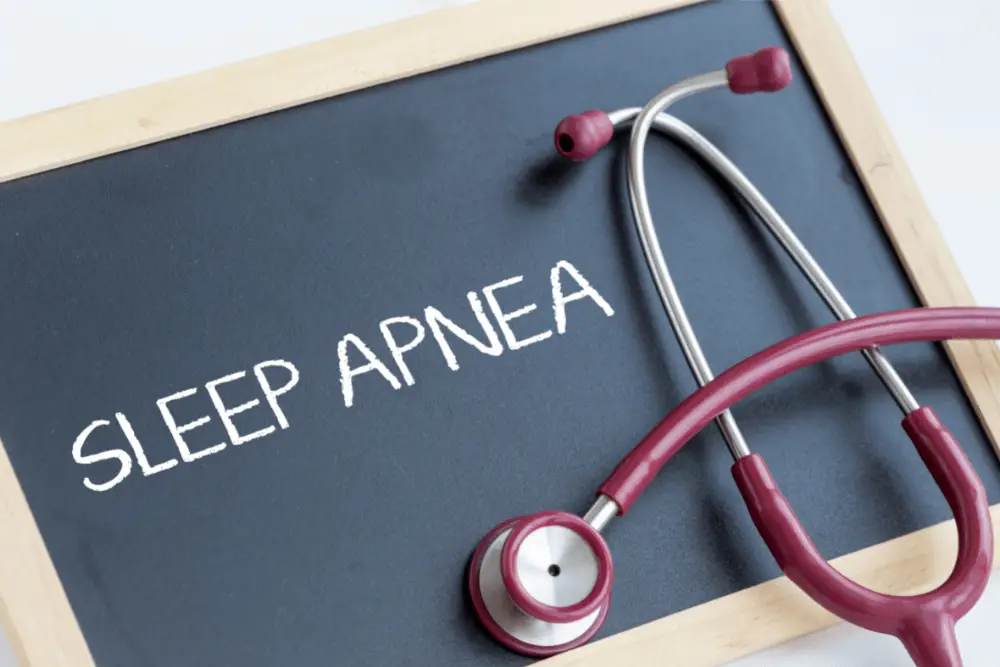Sleep apnea can often lie at the heart of a lot of different disorders, that are all generally categorized as panic attacks. Caused by a narrowing and constriction of the airways that are in turn either caused by obesity or age among other things, Sleep Apnea is a condition in which breathing stops and starts while an individual is sleeping.
In untreated, or undiagnosed, over an extended period of time sleep apnea can lead to frontal lobe brain damage, and can in some cases radically alter the structure of the brain in an individual suffering from sleep apnea.
This restructuring of the brain, and the gradual shrinking of the frontal lobe, can make individuals suffering from sleep apnea far more prone to panic-related disorders than someone who doesn’t suffer from sleep apnea.
This means that not only can sleep apnea be a root cause of anxiety, but it can and often does increase and exacerbate the condition. The combination of disturbed and lower quality sleep, both caused by sleep apnoea and the effect that it has on the frontal lobe can be a devastating combination and can, and often does, cause anxiety.
Can CPAP Help With Anxiety?
As we’ve already established that there is a direct correlation between sleep apnea and the onset of anxiety and other panic-related disorders in sufferers, any treatment designed to deal with the symptoms of sleep apnea, should in theory, also help to combat the symptoms of anxiety.
As CPAP machines were designed to treat sleep apnea and help those who suffered from, and continue to suffer from the condition, there is direct medical evidence (as cited by the European Respiratory Journal) that CPAP machines can help ease the symptoms of anxiety.
However, it should be noted that CPAP machines were, and are, only an effective way to help to ease the symptoms of anxiety in individuals whose sleep apnea was a direct cause of their anxiety. CPAP isn’t an effective form of treatment for anxiety in individuals who don’t suffer from sleep apnea and whose anxiety had and has a different root cause.
So, even though CPAP can, and does help certain individuals to effectively deal with the cause of their anxiety, it shouldn’t be seen as a blanket treatment for the disorder, as it doesn’t, and won’t, help everyone who suffers from anxiety.

Is Sleep Apnea Secondary To Depression?
There have been a number of medical studies that have sought to prove the causal links between sleep apnea and depressive disorders and whether the former was a contributing factor to the latter. And in each and every study, the link between sleep apnea and depression was categorically proven and established.
Sleep apnea can and does starve the brain of oxygen while the individual suffering from the disorder is sleeping. As the flow of oxygen into the bloodstream isn’t constant and stops and starts in an individual suffering from sleep apnea, it can effectively lead to oxygen depletion, which can cause damage to the frontal lobe of the brain, which is a direct contributory factor that can lead to, and cause of a number of depressive disorders
As it can also lead to inflammation and swelling in muscles and joints, sleep apnea is also regarded as a secondary cause of depression as it can prevent neurotransmitter activity, which can heighten and exaggerate symptoms of depression that have already started to manifest themselves.
While it isn’t a primary contributory factor, because of the effect that sleep apnea has on neurological structure and activity of the brain, it is seen as being a secondary cause of, and contributing to the development of, a variety of depressive disorders.
Can CPAP Cause Panic Attacks?
Unfortunately, CPAP can and sometimes does cause panic attacks in individuals who have started a treatment regime.
It isn’t uncommon or unusual for an individual to suffer from ‘CPAP claustrophobia' when they initially begin treatment, as feeling as if you're trapped when attempting to sleep with a mask on your face while hooked up to a machine is a perfectly natural, human reaction.
It’s a feeling that’s heightened in individuals who already have a history of claustrophobia and a fear of confined spaces, and being confronted with having to wear a CPAP mask while undergoing treatment can increase the chances of the individual succumbing to their claustrophobia. This in turn causes a surge of adrenaline to flow through their body of the individual in question, which can trigger a panic attack.
While there is a risk involved in the initial stages of treatment, studies have also shown that the longer an individual undergoes CPAP therapy and treatment, the lower the chances are that they’ll suffer from an attack of ‘CPAP claustrophobia’, which reduces the chance of the individual suffering a CPA induced panic attack.
So, yes CPAP can cause panic attacks, but the longer an individual uses the machine and mask, the less likely it is to happen.
Does Sleep Apnea Cause Anger?
While it’s a proven cause of increased aggression in children, the sad and unfortunate truth is that untreated sleep apnea can also have a similar effect on adult sufferers.
Among its many devastating physical and mental effects such as constant fatigue, confusion, and headaches, sleep apnea can also be a cause of depression, personality disorders, and most importantly, as far as the manifestation of anger is concerned, mood swings.
The fatigue and effect that being forced to deal with the multitude of other symptoms that sleep apnea can and does cause make individuals plagued by it far more likely to “snap” as their reason and judgment are impaired.
This impairment can lead to the aforementioned mood swings, which often appear as an unexplained, and irrational burst of anger. It is, as we’ve already said, an unfortunate truism that sleep apnea can lie at the heart of a lot of seemingly unrelated disorders.
This is why it’s so important to be tested and checked to find out whether or not you do suffer from sleep apnea if you think that there is even a remote possibility that you might be one of the many undiagnosed sufferers of this troubling and persistent condition.

Damon Wiseley is a Registered Respiratory Therapist and Certified Pulmonary Function Technologist.
